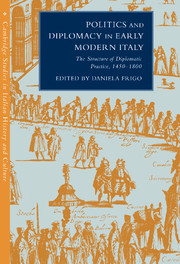Book contents
- Frontmatter
- Contents
- Introduction
- Diplomacy and government in the Italian city-states of the fifteenth century (Florence and Venice)
- Aspects of Medicean diplomacy in the sixteenth century
- An outline of Vatican diplomacy in the early modern age
- Economic and social aspects of the crisis of Venetian diplomacy in the seventeenth and eighteenth centuries
- ‘Small states’ and diplomacy: Mantua and Modena
- Neapolitan diplomacy in the eighteenth century: policy and the diplomatic apparatus
- Savoyard diplomacy in the eighteenth century (1684-1798)
- Index of names
- CAMBRIDGE STUDIES IN ITALIAN HISTORY AND CULTURE
‘Small states’ and diplomacy: Mantua and Modena
Published online by Cambridge University Press: 29 October 2009
- Frontmatter
- Contents
- Introduction
- Diplomacy and government in the Italian city-states of the fifteenth century (Florence and Venice)
- Aspects of Medicean diplomacy in the sixteenth century
- An outline of Vatican diplomacy in the early modern age
- Economic and social aspects of the crisis of Venetian diplomacy in the seventeenth and eighteenth centuries
- ‘Small states’ and diplomacy: Mantua and Modena
- Neapolitan diplomacy in the eighteenth century: policy and the diplomatic apparatus
- Savoyard diplomacy in the eighteenth century (1684-1798)
- Index of names
- CAMBRIDGE STUDIES IN ITALIAN HISTORY AND CULTURE
Summary
INTRODUCTION
At the beginning of the modern age, the Po Valley was an area in which the fragmentation of power typical of the late Middle Ages coexisted with a progressive consolidation of power in more or less stable forms. In this area of densely concentrated powers, populated by towns, signorie and ecclesiastical orders, the Estensi and the Gonzaga, in Ferrara and Mantua respectively, brought into being a form of power management and a model of government that traditional historiography has summed up in the expression ‘Renaissance state’. And it was in this area that Cesare Borgia, whom Machiavelli later cited as an example of the ‘new prince’, prosecuted his political and military ventures at the beginning f the sixteenth century. In this territory, papal nepotism achieved a further significant success with the creation of the Farnese Duchy of Parma and Piacenza. And it was here, finally, that the process of crisis and decline of the Italian principalities got prematurely under way, foreshadowed in 159by the devolution of Ferrara to the Papacy.
Amid the political equilibria of the late fifteenth century and the wars of the early sixteenth century, the Gonzaga and Estensi played a pivotal role in Italian politics. In their numerous and shifting alliances with the French and the Spanish, the two dynasties displayed consummate diplomatic skill as they responded to the alternating fortunes of armies by rapidly switching sides. But with the Peace of Cateau-Cambrésis (1559) and with the consolidation of Spanish dominion over a large part of the Peninsula their protagonism in foreign affairs seemingly ceased.
- Type
- Chapter
- Information
- Politics and Diplomacy in Early Modern ItalyThe Structure of Diplomatic Practice, 1450–1800, pp. 147 - 175Publisher: Cambridge University PressPrint publication year: 2000
- 6
- Cited by

